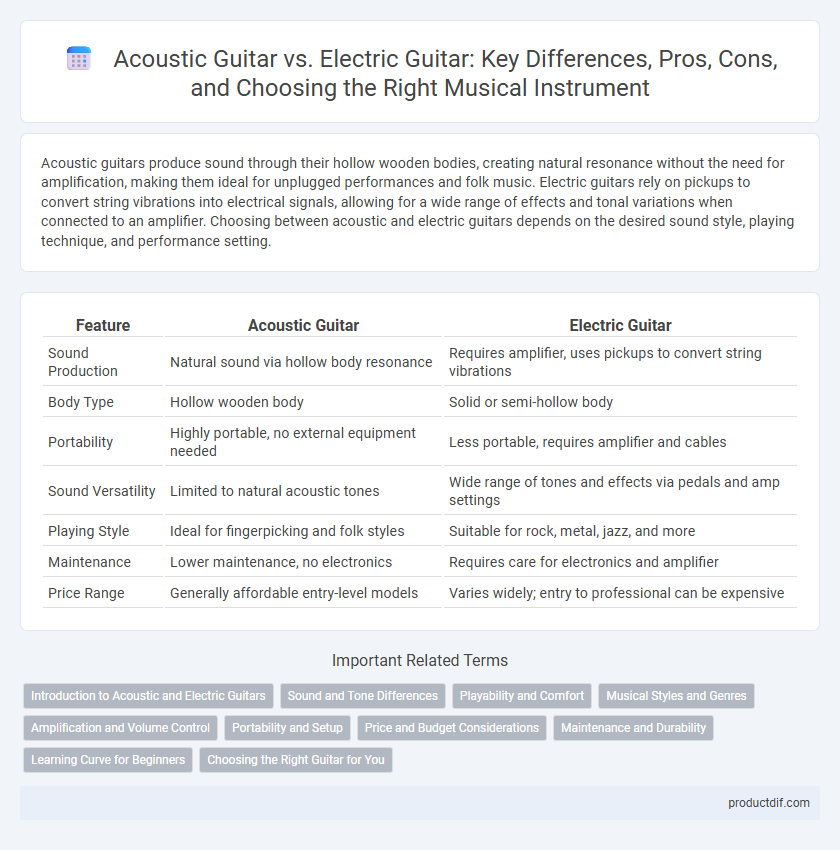Acoustic guitars produce sound through their hollow wooden bodies, creating natural resonance without the need for amplification, making them ideal for unplugged performances and folk music. Electric guitars rely on pickups to convert string vibrations into electrical signals, allowing for a wide range of effects and tonal variations when connected to an amplifier. Choosing between acoustic and electric guitars depends on the desired sound style, playing technique, and performance setting.
Table of Comparison
| Feature | Acoustic Guitar | Electric Guitar |
|---|---|---|
| Sound Production | Natural sound via hollow body resonance | Requires amplifier, uses pickups to convert string vibrations |
| Body Type | Hollow wooden body | Solid or semi-hollow body |
| Portability | Highly portable, no external equipment needed | Less portable, requires amplifier and cables |
| Sound Versatility | Limited to natural acoustic tones | Wide range of tones and effects via pedals and amp settings |
| Playing Style | Ideal for fingerpicking and folk styles | Suitable for rock, metal, jazz, and more |
| Maintenance | Lower maintenance, no electronics | Requires care for electronics and amplifier |
| Price Range | Generally affordable entry-level models | Varies widely; entry to professional can be expensive |
Introduction to Acoustic and Electric Guitars
Acoustic guitars produce sound through the vibration of strings resonating within a hollow wooden body, offering rich, natural tones ideal for folk, classical, and unplugged performances. Electric guitars rely on electromagnetic pickups to convert string vibrations into electrical signals, allowing amplification and sound modification through effects and amplifiers, making them essential in rock, jazz, and blues genres. Both types feature variations in body shape, string type, and playability, catering to diverse musical styles and player preferences.
Sound and Tone Differences
Acoustic guitars produce a natural, warm sound with rich resonance due to their hollow wooden bodies that amplify string vibrations organically. Electric guitars rely on magnetic pickups to convert string vibrations into electrical signals, allowing for a wide range of tonal modifications through amplifiers and effects pedals. The acoustic guitar's sound is more organic and mellow, while electric guitars offer sharper, more versatile tones suitable for various music genres.
Playability and Comfort
Acoustic guitars feature a thicker neck and higher string action, which may require more finger strength and can impact playability for beginners. Electric guitars offer slimmer neck profiles and lighter string gauge, allowing easier fretboard navigation and enhanced comfort during extended sessions. The reduced tension and ergonomic design of electric guitars make them preferable for fast playing styles and intricate finger movements.
Musical Styles and Genres
Acoustic guitars excel in genres like folk, country, and singer-songwriter styles due to their warm, natural sound and resonance. Electric guitars are predominant in rock, metal, and blues, offering versatile tonal effects and sustain through amplification and pedals. Musicians often choose based on desired sound texture and genre-specific techniques, such as fingerpicking on acoustics or distortion-heavy solos on electrics.
Amplification and Volume Control
Acoustic guitars produce sound naturally through their hollow bodies, offering limited volume control that relies on physical playing dynamics and resonance. Electric guitars depend on electronic amplification via pickups and external amplifiers, allowing precise volume adjustments and tonal modifications. This amplified setup enables electric guitars to be more versatile in different performance settings, from quiet practice to loud concerts.
Portability and Setup
Acoustic guitars offer superior portability with no need for additional equipment, making them ideal for on-the-go playing and spontaneous sessions. Electric guitars require amplifiers, cables, and often pedals, increasing the complexity of setup and transport weight. Musicians prioritizing ease of travel and quick setup often prefer acoustics, while those valuing sound customization accept the added bulk and preparation time of electrics.
Price and Budget Considerations
Acoustic guitars generally offer a more affordable entry point for beginners, with quality models available between $100 and $500, while electric guitars often require additional investments in amplifiers and accessories, raising the overall cost to $300 or more. Budget-conscious buyers should factor in the cost of amplifiers, cables, and effects pedals when considering electric guitars, as these extras can double the initial expense. Acoustic guitars provide a cost-effective choice without extra equipment, making them ideal for those seeking simplicity and lower upfront costs.
Maintenance and Durability
Acoustic guitars require regular humidity control and periodical cleaning to prevent wood warping and finish damage, while electric guitars demand more attention to electronic components, including pickups, wiring, and potentiometers. The solid-body construction of electric guitars generally offers enhanced durability compared to the hollow-body acoustic design, which is more susceptible to environmental changes and physical impact. Proper maintenance of both instrument types extends lifespan, but electric guitars typically offer greater resilience under varied playing conditions.
Learning Curve for Beginners
Acoustic guitars offer a straightforward learning curve for beginners due to their simplicity, requiring no additional equipment like amplifiers or pedals. Electric guitars have lighter strings and smaller necks, making fretting easier, which can accelerate skill development for some learners. Beginners often find acoustic guitars build finger strength and technique effectively, while electric guitars allow more tonal experimentation early on.
Choosing the Right Guitar for You
Choosing the right guitar depends on your musical style, budget, and playing environment. Acoustic guitars offer natural resonance and portability, ideal for beginners and unplugged performances, while electric guitars provide versatile sounds and require amplifiers, suited for rock, jazz, and studio settings. Evaluating factors like tone preference, practice space, and genre will guide a more informed choice between acoustic and electric guitars.
Acoustic Guitar vs Electric Guitar Infographic

 productdif.com
productdif.com